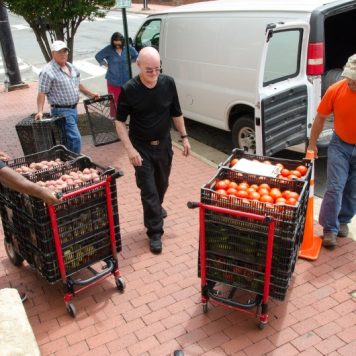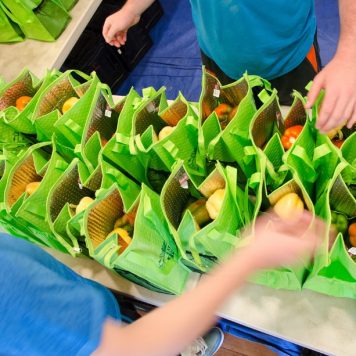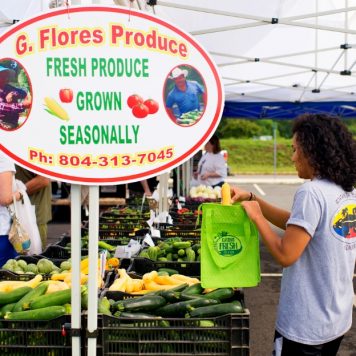Changing habits is hard. Especially when popular culture and big business constantly supply reasons why making a switch is not worth the effort. Take healthy eating. How many times have you heard it’s too expensive to eat fresh foods, it’s too hard to cook every night and it doesn’t taste good anyway.
Imagine coming from a family dealing with food insecurity which is defined as a lack of consistent access to enough food for an active, healthy life. Those common barriers to preparing healthy food can often seem insurmountable.
Thanks to a generous grant from the Virginia Department of Health, the Dr. Yum Project, Virginia Community Food Connections, and our region’s Women Infant Children (WIC) offices have teamed up to help the more than 31,000 people in the surrounding Fredericksburg area who are struggling with food insecurity. We are showing them ways to overcome these barriers to healthy cooking and helping to introduce nutritious eating habits to those in need. The Produce Packs Project gives Women Infant Children (WIC) free access to nutritious foods on a regular basis during the summer months. This program introduces families to a new way of eating and helps lay the foundation for raising healthy kids.
delivery
Each week, produce is delivered to St. George’s Church Kitchen with cold storage capabilities.



volunteers
There are teen volunteers from Chaplin Youth Center who work on Sunday afternoons to pack cooler bags with a variety of fresh produce provided by local farmers.



clinics
Each produce pack is then taken to area Health Departments and WIC clinics, where a food tasting is held in the lobby sharing a recipe that uses the produce received that week.


wic clients
The produce packs are given out to WIC clients during their regular check-in visit.


in the bag
Each bag comes with educational information, including how to store and handle fresh ingredients and a recipe using the ingredients in the pack. The recipients can then take the empty produce pack bag back to the farmer’s market to have it refilled up to three times for free.



impact
The Centers for Disease Control and Prevention released the 2016 Early Care and Education (ECE) State Indicator Report which noted that children who are overweight when they enter kindergarten are four times more likely to struggle with obesity in 8th grade, as compared to their peers who are normal weight, and that childhood weight status often tracks into adulthood. One of the driving forces behind these skyrocketing obesity rates is the heavy reliance on processed food and food prepared outside the home.
Getting fresh produce into the hands of those who are considered food insecure is a major step in the right direction. They are being introduced to healthy produce, how to prepare it, where they can find it, and why it’s so important for their families. This is a win-win for everyone in the community and we are privileged to be a part of it.
